clan dest ino







We are living in a time when everything is mea surable, monetizable, structured, and in eternal orderliness: art, care, love, and belief systems are no exc eption. But underneath it all thrives a chaos that we struggle to cultivate. And it seems we have lost both the language and tools to endure living with the unexplainable and unclassifiable—that is life.
This year’s edition of Clandestino is a ringing, musical novella where autofiction, fantasy, outrage, and poetry meet at a festival spread across several venues in Gothenburg (and an antenna at the legendary Fasching in Stockholm). A musical novella about the right to glimpse the horizon of unknowing.
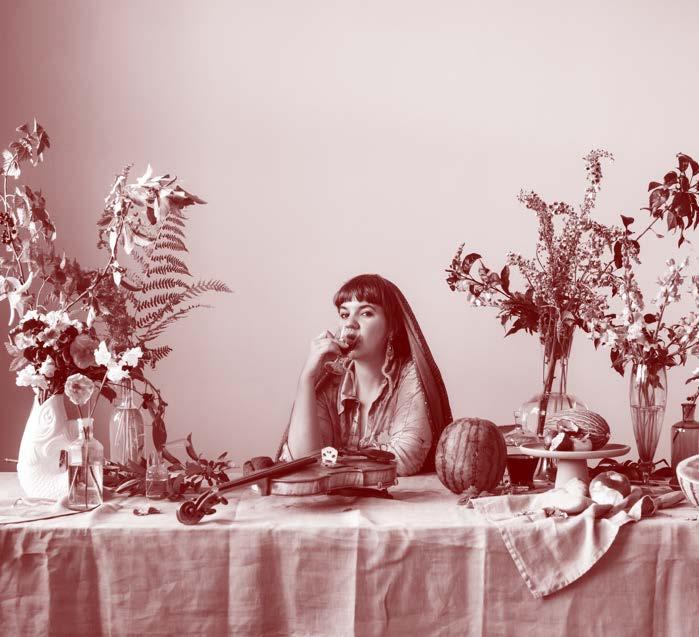
And like friends in the palm of our hands, we get musicians, thinkers, and poets who know what it is to expand time and space to create room for the present. Who use their belief as a political weapon and, unambiguously but carefully, guide you towards the big questions.
“We stand on a beach, looking for a price tag amongst the weathered stones.”
The Swedish writer Johannes Anyuru floored me with those words in his lyrical essay “Alhambra” (Glänta
no. 4/2017). It’s a piece that describes the political potential of religion, and belief as a weapon against the dirty and oppressive mechanisms of capitalism. This piece opened up a wider space for existential and political discussion.
The very same summer, I read an essay by the former archbishop K.G. Hammar, who formulated the role of Christianity within the ongoing climate crisis. He wrote:
“If the climate crisis is not foremost a political or technical but rather existential question, the solution will likewise be neither political nor technical. A change will be possible only when an existential reappraisal causes many to tell our decision makers that caring for our planet and all its lifeforms and living ecosystems is more important than private or national consumption and living space.”
And music has the same power and potential; it is a humming shepherd, leading us into the most obscure nooks and crannies, where we can seek shelter for the night and feel an unfamiliar but assured trust in face of the future.
Clandestino’s musical novella will weave the unexplainable, daring to dwell in the unknown. It is a novella that seamlessly walks between drone and text, melody and fete, belief and doubt, dance and dialogue. A ringing novella of existence and the everyday. In these hopeless times, belief feels the most radical, because within belief exists a budding hope. Belief in something bigger, belief in meaning, belief in the power of art, belief in the magic of music.
Because we need places for music that resist categorization. Places allowed to resist the streamlined services and technocracies which increasingly deny music’s trouble, mess, and sprawl. Clandestino is such a place. Take care of it, take part of it, and let yourself flourish inside the uncertain—for it is there you will feel.
Sara Parkman
Swedish Championship Gold in culture. Emotional wreck.
But extremely fun, according to some other wrecks at Clandestino.
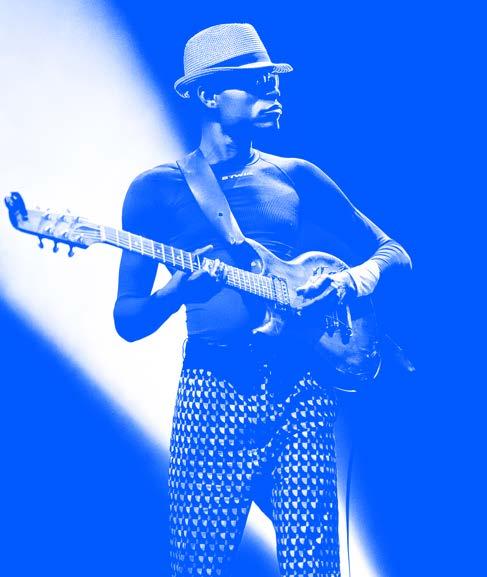
THURSDAY 4TH OF JUNE OCEANEN
When the Somali civil war broke out, Sahra Halgan was a teenager with dreams of being a singer. She soon found herself working as a singing nurse for the rebels fighting for Somaliland’s lib eration from Siaad Barre’s regime. She arrived in Lyon, France as a political refugee in 1992, where she worked in a café and as a musician. Today, she is back in Somaliland where she runs a center for musicians and poets. Considered an icon to many in her home region, her unique, clear voice
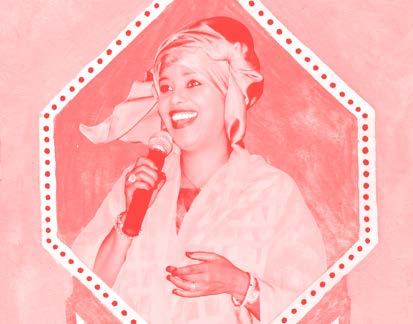
This funky seven-man group was formed by Bamba Dembélé, originally designed as a tribute for the legendary Super Djata Band, a combo that rocked their homeland of Mali in the 70s. With refined balafon rhythms and polyphonic riffs, Bamba Wassoulou Groove have succeeded in reviving songs from both these and other Malian heroes with splendour: High life, desert blues and folk music from the Wassoulou region, as well as inspiration from American blues and soul, creates an exuberant mixture. With no less than three guitarists, the numerous terrific solos make up a great deal of the magic. But Bamba Wassoulou Groove also develops the genre fur ther with new material which is just as exciting. Their new album Dankélé will be released on the label Lusafrica in 2020, and an early listen hints at a showcase of funky rhythms and fabulous guitar slinging taken to the next level.
with its powerful vibrato is synonymous with the freedom struggle. But instead of resting on her laurels, Sahra Halgan wants to use her music to spread the word about Somaliland—a selfproclaimed state not recognized internationally. She still has strong ties to Europe, not least through the two remaining members of her trio, Aymeric Krol and Mael Saletes. Together, they create a global Somaliland music with seriously funky drums and electric guitar.
THURSDAY 4TH OF JUNE OCEANEN
With psychedelic guitars, Miami Vice-esque synths and fat bass lines, Ultra Satan makes funky folk music from outer space. Or Fre edom Rock, as this Gothenburg all star combo have called it. The band includes members from experimental and krautrock-inspired acts such as SPR, Fontän and Uran GBG, and on stage they have collaborated with Tentakel as well as visual artist Ekta. So far, Ultra Satan have released a handful of vinyl records in which they aim their syncopated punches against
our contemporary treadmill work ethic, overconsumption, inequality and capitalism in general. Attentive listeners will find themes about tearing down the enslavement machine that is today’s society and building something more human in its place. However, this group is still able to mix philosophy with a punk attitude: like when they designed band t-shirts replacing the name in Västra Götaland county’s iconic green-blue logotype with their own, triggering a minor media storm.
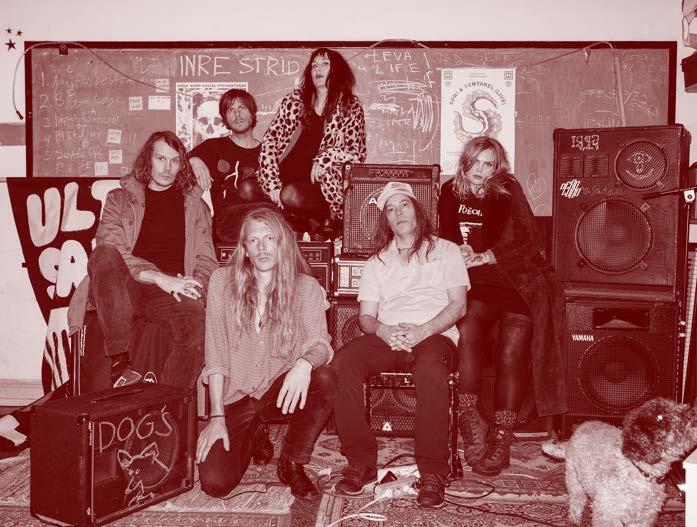
FRIDAY 5 TH OF JUNE FYRENS ÖLKAFÉ
Guitarist, multi-instrumentalist and leader of psychedelic rock band Acid Mothers Temple. But while best known for his earsplitting, speed guru guitar heroics with AMT, Makoto is also the founder of his own school of ecstatic guitar drone, using bowing and glissando techniques.
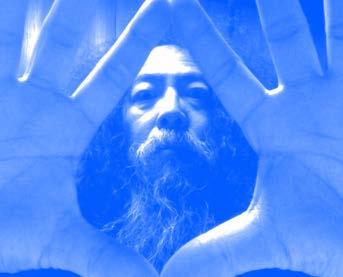
Kawabata first started releasing works for electronics and homemade instruments in 1978. Since then he has toured and released albums with multiple units, spanning multiple genres.
He has played with psychedelic originators like Gong, Silver Apples and Träd Gräs och Stenar; with avant-garde giants including Keiji Haino, Tatsuya Yoshida and Charles Hayward; and with Occitan trad musicians including Rosina de Peira, Marc Perrone and Beatritz. In 2019 he began to perform and create new works for modular synthesizers, a return to the electronic music from where he started his musical career. This concert is presented in collaboration with Koloni.
FRIDAY 5 TH OF JUNE FOLKTEATERN
SUNDAY 7 TH OF JUNE MUSEUM OF WORLD CULTURE
At a party deep in the forests surrounding Texcoco in Mexico, La Bruja (the witch) was born. While there accompanying a group of folk musicians on violin, Octavio Mendoza Anario miraculously rescued a woman possessed, collapsed in the convulsions of an evil demon. Holy rites were performed and Octavio, who hitherto had identified as a cis-man, was declared the witch of Texcoco. Dressed in a colorful huipil, the traditional garment common among indigenous women, wearing makeup and false eyelashes, the witch sings in a deep, warm voice and plays violin, viola, cello and harp, all with virtuosity. La Bruja’s fascination for the traditions of Mexico grew after years of struggling as a musician. As a child, Octavio had played the tambourine in their father’s gold-suited Acapulco-style band. A few years later, they spent thousands of hours practicing Mozart and Vivaldi, but became increasingly disenchanted by the hierarchies of European classical music. As La Bruja de Texcoco, they reinvent Mexican folklore by deepening the mystique, while at the same time liberating it from machismo.
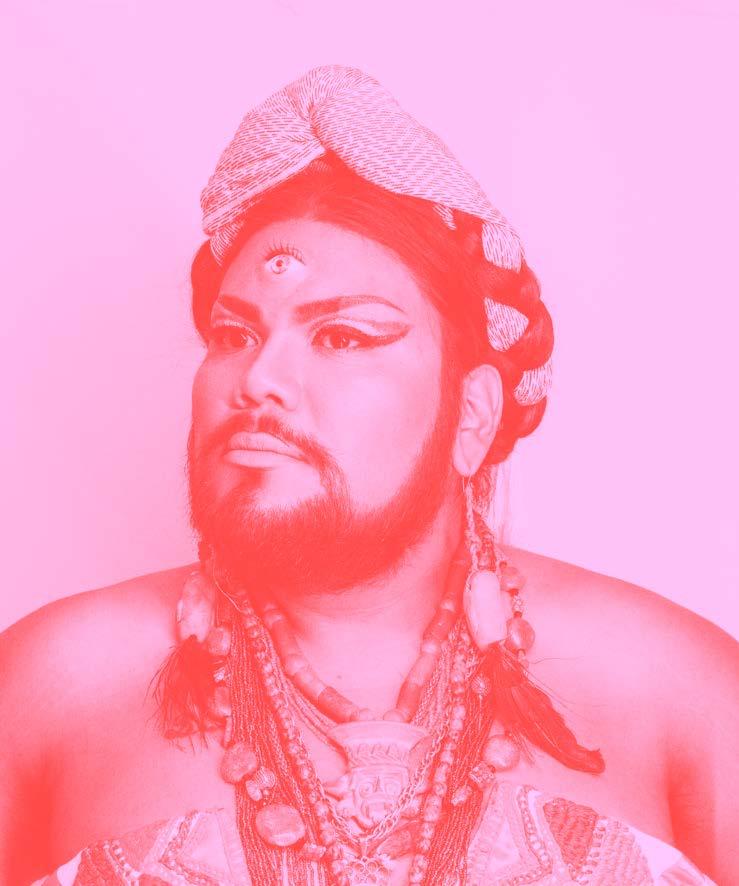
Through their mega-sexy performance art and music, this Johannesburg duo is fighting to change the lives of black LGBT people in South Africa—and across the world! Fela Gucci and Desire Marea can pull any audience into the vibrant dance performance that is their live show. With wigs and lofi video projections, they make a gesamtkunstwerk-ish experience out of their electronic dance music, gqom—a kind of bare bones house music created in South Africa’s townships. Gqom is distributed via authentically DIY methods, such as by taxi drivers who play the latest productions for their fares on the way out for a night on the town. FAKA call their extraordinary creation gqom-gospel “laments for cock.” When not
performing their own music, FAKA are resident DJs at Cunty Power, a club that wants to make a safe and fun party zone for queer, trans and non-binary night owls in Johannesburg. The world out side of Africa became aware of FAKA when Mykki Blanco interviewed them in his South African docum entary Out Of This World, and the duo made their first Swedish performance in a wild live show at Clandestino Festival 2018. Since then, they have written the soundtrack for a fashion show by Donatella Versace and per formed at nightclubs, as well as given academic talks around the globe, proving that they are determined once more to make sure plenty of ass—not to mention worldviews—will be shaken to their foundations.

SATURDAY 6 TH OF JUNE FOLKTEATERN
She began playing violin at the age of seven, and later studied classical music at the Tallinn College of Music. However, driven by her curiosity and passion for folk music, Maarja Nuut has delved deep into many other genres. At 21, she traveled to New Delhi to study traditional music. After returning to Estonia, she began digging in archives for field recordings of pre-Soviet era songs from rural villages. She continued her studies in Stockholm and immersed herself in music from, among other places, the Polish countryside. In the pursuit of a universal language, Nuut uses her violin, voice and a loop pedal to combine the moods, stories and melodies of forgotten villages and people, creating enchanting live performances. Maarja Nuut is a master of the subtle, demonstrating with small means the enormous possibilities of expression contained within the human voice. Among her many collaborations are projects with Estonian chamber choir Sireen, Sun Araw, Howie B and Hendrik Kaljujärv, aka Ruum, on their latest record Muunduja—an experimental journey through electronic sounds.
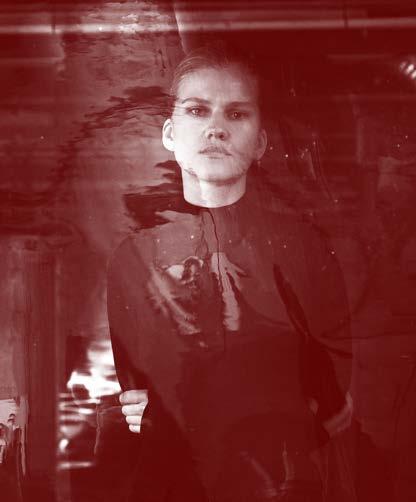
FRIDAY 5 JUNE FOLKTEATERN
Imagine a West African version of James Brown, high on buckets of espresso while acc elerating into hyperspace in a rusty tie-fighter. No? Okay, option two: Listen to Rob’s debut album Funky Rob Way from 1977. Rob Roy Raindorf is a true legend, sprung from Ghana’s most soulful nightclubs of the seventies, back in the spotlight again after years in obscurity. As a young man he was fascinated by Otis Redding, Wilson Pickett and of course The Godfather of Soul, Mr. Brown himself. He studied piano and was soon performing with greats such as Orchestra Poly-Rythmo de Cotonou. At the age of 28, Rob joined forces with the military orchestra Mag 2. Delightful, cosmic afro funk emerged, dripping with wahwah guitars and congas. His debut was followed by Make It Fast, Make It Slow, famously sampled by J Dilla and Camp Lo. When the release of album #3, the doomsday disco epic Hellfire was cancelled, Rob disappeared from the spotlight and started working as a restaurant manager instead. But that all changed recently, when the Analog Africa label started its vinyl press, presenting the old songs to a whole new audience. What’s Rob like live in 2020? Backed by a tight combo, he dances on stage wearing a black hat, sunglasses and a glittery suit—he’s a funk explosion that just has to be experienced!
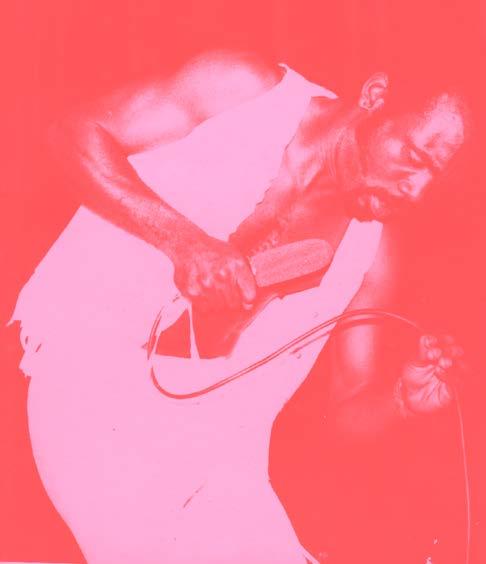
SATURDAY 6 TH OF JUNE LITTERATURHUSET
The artistic research journal PARSE will release its latest journal under the topic of Art & Migration. It contains contributions from artists, writers and critical border scholars inquiring into the embodied, affective, performative, material, visual, and spatial politics of cross-border human mobilities. The journal issue is comprised of articles, essays, visual art, fiction and poetry, and podcasts, and during the release the poet and artist Elyas Alavi will give a reading of his work and Kitso Lelliott an artist talk. This issue is edited by Erling Björgvinsson, Nicholas de Genova, Mahmoud Keshavarz and Tintin Wulia. PARSE is based at the Faculty of Fine, Applied and Per forming Arts at Gothenburg University and this issue was made in collaboration with the Centre on Global Migration at Gothenburg University.
Kitso Lelliott is an artist based in Johannesburg, South Africa, that is preoccupied with
enunciations from spaces beyond epistemic power and the crisis such epistemically disobedient articulations cause to hegemony. Her work interrogates the ‘real’ as it is shaped through contesting epistemologies, their narratives and the form these took over the Atlantic during the formative episode that shaped the modern age. Her work is an enactment of enunciating from elision and between historically subjugated subjectivities, privileging South-South relations in relation to yet imaginatively and epistemologically unmediated by the Global North.
Elyas Alavi is a multi-disciplinary visual artist and poet based in Adelaide, South Australia. Alavi was born in Daikundi province, Afghanistan, and moved to Iran as a child, following the intensification of war in his homeland. Late 2007 he moved to Australia as refugee at risk. He has exhibited nationally and internationally
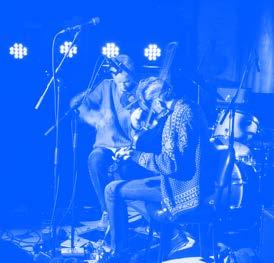
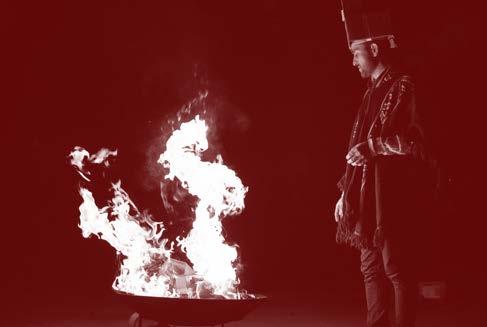
SATURDAY 6 TH OF JUNE FYRENS ÖLKAFÉ
Nordic folk music as you’ve never heard it, most likely. Swedish magazine Lira called the brothers’ album Pusinshi Ulla one of the most remarkable recordings in the genre, while British Folk Radio drew parallels to the Velvet Underground. Without ever becoming cerebral or boring, Hans and Rasmus Kjorstad execute one successful experiment after another. It’s scratchy, distorted, full of funny little thumping sounds, and sometimes the music moves in atonal rhythms, almost like a distant relative of Konono
No. 1. Despite this challenging and almost punky attitude, their interpretations of hallings, springleiks and so on always come across as playful and shimmeringly beautiful. The brothers are from Fron in Gudbrandsdalen, where they have played since childhood. In addition to violins, they use their voices as well as flutes, a jew’s harp and the ancient Norwegian drone zither langeleik. Through improvisation, stories and lofi-aesthetics, they want to introduce a wealth of melodies for new listeners.
and is an internationally renowned poet. Alavi has published three poetry books in Iran and Afghanistan. His first book of poetry was I’m a daydreamer wolf published in 2008. It was followed by Some wounds in 2012 and Hodood in 2015. Alavi visits many issues in his works, such as memory, migration, displacement, exile, and gender issues. The main part of his work as an artist reflects upon his Hazara background (a marginalised ethnic group originally from Afghanistan) as he uses his particular experiences and contemplations as an epistemological model for the dislocation of people. The autoethnographic approach offers a representative perspective for other displaced people and contributes to a deepening knowledge of the refugee and migration experience. Alavi regularly runs art and poetry workshops in community centres and schools in Adelaide.
SATURDAY 6 TH OF JUNE LITTERATURHUSET
In his latest poetry collection, the T. S. Eliot Prizewinning A Portable Paradise, Roger Robinson investigates the idea of a utopian paradise— the weight this word holds for his country Great Britain, and what it means in relation to his prematurely born son. He writes about the paradise that was denied the people of Grenfell Tower. The paradise that for decades has been denied the Windrush generation, who crossed the sea from the former Caribbean colonies to Great Britain. And for those captured within modern forms of slavery. Prayers for those lost and those left behind. Prayers to heal the traumas so constantly repeated in our age.
Roger Robinson is a poet and performer, an activist, and the vocalist in King Midas Sound. He
was born in the northwest borough of Hackney in London, but as a three year old returned to his parent’s Trinidad. He was captivated by his mother’s magical storytelling over the dinner table, and attended the most prestigious schools on the island while his father worked as a PR executive for an oil company—one of the first black men to reach such heights. He returned to London as a teenager, and during the nineties made a name for himself in the capital’s poetry movement. He combines his own writing with giving writing workshops in London’s schools.
A Portable Paradise will be published in Swedish through Rastlös Förlag during the autumn of 2020 in translation by Maziar Farsin.

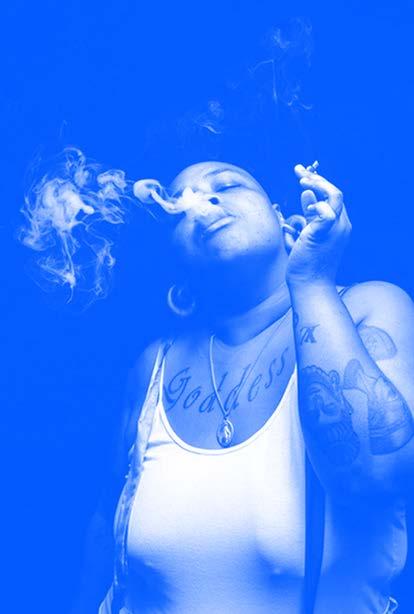
In the video for Goddess, we see her wearing a blue Cleopatra dress and a tiara resplendent with gold feathers. Delish is holding court, gazing down towards the floor upon a pra ctically naked man engaged in an erotic dance, his skin painted gold. Message delivered with due clarity: Nobody puts Delish Da Goddess in the corner. Growing up in Violet, Louisiana—a city with little room for a queer female rapper with a stern radiance like hers—she soon found her place in New Orleans. To beats that mix bounce and trap, she raps about female perspectives on feeling divine, or just generally being hot and awesome. In an interview, Delish revealed that when writing she puts herself in the mind of a man, thus allowing herself a power and bos siness otherwise monopolized by male rappers. Her idea is to make songs into ammunition for every woman who has ever felt trampled on. She’s released several EPs, but so far nothing has really captured the punky feeling of Delish Da Goddess live. With a rap style characterized by raw screams, all at once she captures the carnival tradition of New Orleans, ecstatic gospel and soul music, and the queer futuristic hip hop currently coming out of Louisiana.
SATURDAY 6 TH OF JUNE FOLKTEATERN
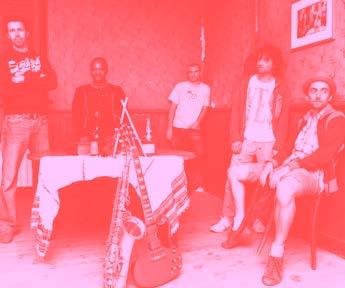
Dressed in snazzy suits and black bow tie, singer Asnake Gebreyes was a phenomenon back in the 80s and 90s. His ornamental tenor could be heard on radio, TV, and countless cassette releases in Ethiopia. Weyene Ajire (my mysterious brother) became a smash hit and is a classic to this day. Outside Africa, however, Gebreyes’ music was difficult to find until musicologist Francis Falceto reissued it as part of his celebrated album series
Éthiopiques Falceto also introduced Gebreyes to French guitarist Damien Cluzel, who happened to be in Addis Ababa as part of a travelling circus company. After falling in love with the local jazz tradition, Cluzel returned to Lyon with the idea of starting a band that combined his own heavy rock riffage with Ethiopian sounds. Asnake Gebreyes agreed to join in on vocals, and soon uKanDanZ was in the studio recording their first
record. A marriage of Mulatu Astatke and Rage Against the Machine is one way to describe their debut Yetchalal. Fast forward a few years to album number three, Yeketelale, uKanDanZ tone down the distortion, making room for soul, synths and hand claps. Guebrey’s vocals grow into breathtaking melodies, while drums and synth bass lay down some seriously dancefriendly rhythms.
SATURDAY 6 TH OF JUNE FOLKTEATERN
When KOKOKO! exploded the dance floor during their concert at Clandestino Festival 2017, they were unknown and had not even released a single. Since then, they have toured the globe, conquered South by Southwest, and signed with British label Transgressive. KOKOKO! is a collaboration between musicians from the Democratic Republic of Congo and French electronic groove maestro Débruit. During his first visit to the megacity of Kinshasa, Débruit was overwhelmed—electric power kept failing all over the city, but music was heard at every street corner. The majority of musicians could not afford
instruments, making use of whatever was at hand. So when Débruit met members of KOKOKO! and heard their complex techno jams on a xylophone made of plastic containers, accompanied by typewriter drums, he was fascinated. It was the start of a collaboration where Kinshasa’s street sounds merge with the electronic playfulness loved by Débruit’s fans. The result can be heard on the debut album Fongola, a futuristic party record that goes beyond traditions and clichés about African music. They are also featured in Renaud Barret’s documentary film Système K playing right now at a cinema near you.
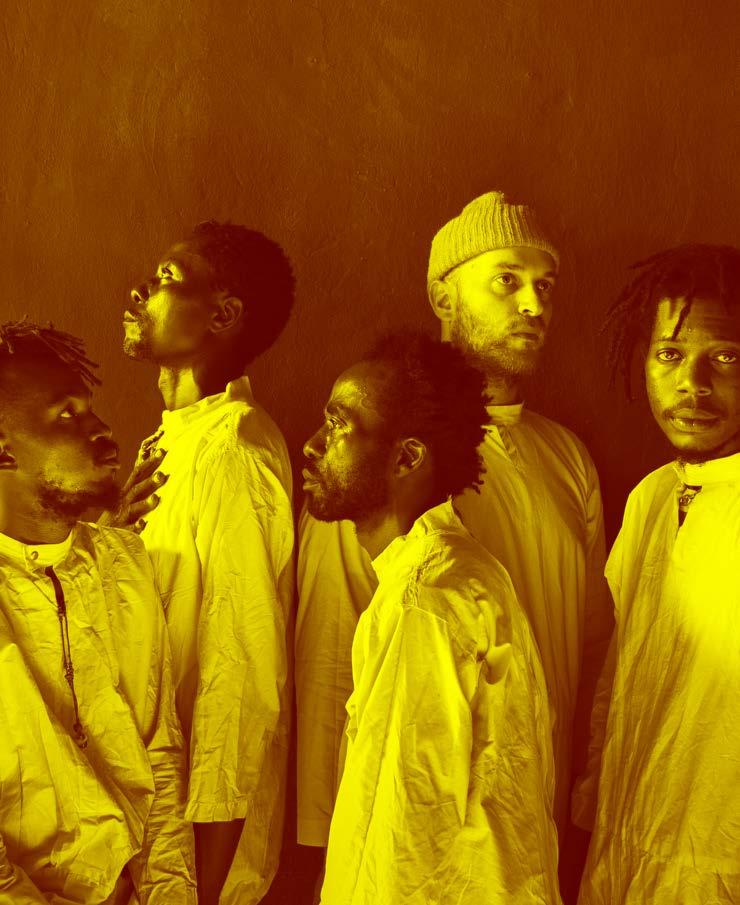
SUNDAY 7 TH OF JUNE HAGAKYRKAN
Her electro-acoustic compositions range from multi-channel electronic pieces and installations to audiovisual works and collaborations with dancers, soloists and ensembles. Maria W Horn is a member of the Sthlm Drone Society and, together with musician Kali Malone, she runs the record label and concert organizer XKatedral. Her debut album Kontrapoetik was born by diving into the history of her home region of Västernorrland—including the executions of 71 alleged witches carried out by the church in the 1670s, and the Ådalen shootings of 1931—
and from her research on satanic feminism. The latest EP Epistasis was composed in part for the Malva Quartet. Here, the listener is invited into a sonic world so dark and atm ospheric even your goosebumps will tremble. A computercontrolled piano, as well as an organ and string instruments, are heard in slow ins trumental pieces inspired by moods and harmonics from black metal and composer Arvo Pärt. Sometimes it sounds like a sacred mass in a mine shaft, sometimes like an abandoned ship, bobbing at sea.
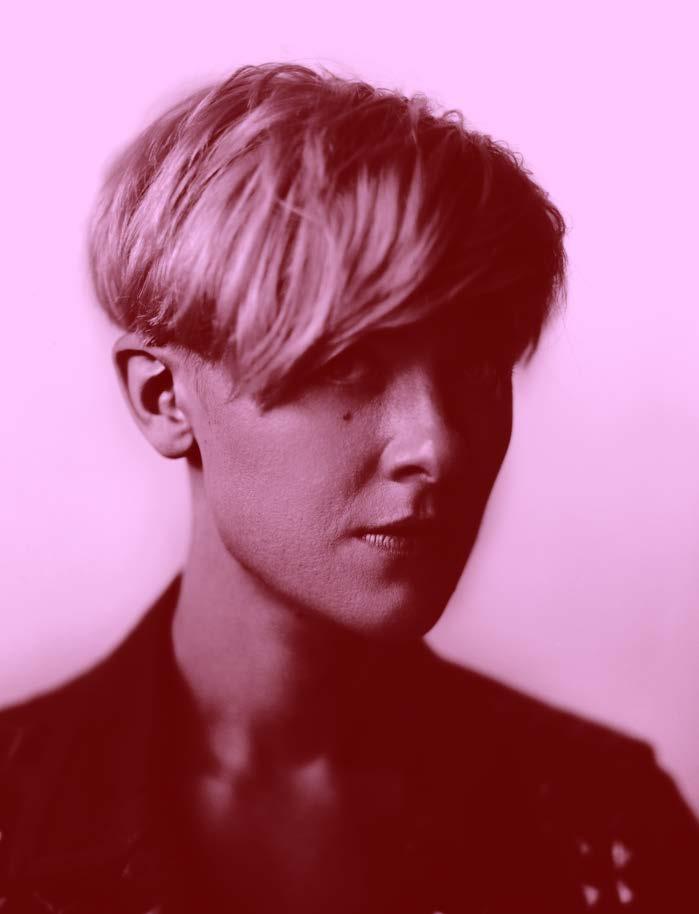
SUNDAY 7 TH OF JUNE HAGAKYRKAN
Shida Shahabi grew up in Stockholm on a mix of Persian pop and Tchaikovsky, and started playing piano as a child. But instead of studying music, she was drawn to the freedom offered by art college. She composed and made sound art, played in bands and experimented. In 2018, she released the album Homes, eight piano pieces that could make even the greyest February morning feel cinematic. Future Music called it “A masterclass in simplicity.” Swimming along in similar musical currents as Nils Frahm, Shahabi’s floating modalities would make Claude Debussy smile. Guests at Clandestino Festival will hear Shahabi play together with cellist Linnea Olsson. Since her 2012 debut Ah, Olsson has per formed frequently in both pop and neo-classical contexts, and has toured globally with both her own music and with Ane Brun, Frida Hyvönen, Peter Gabriel and others. Here, her cello tones hover like an electric storm on the horizon, while we hear the mechanics inside Shahabi’s piano, hundreds of pieces of wood creaking at every touch of the instrument’s keys—a complicated machine, maybe a pair of impossible wings made out of wood.
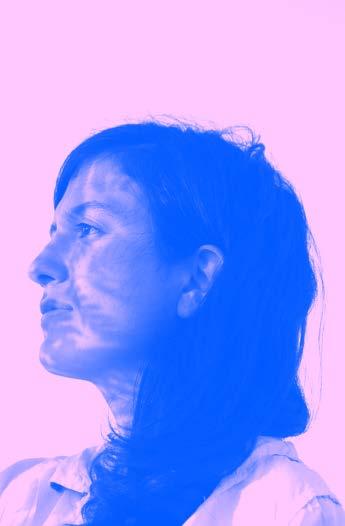
SUNDAY 7 TH OF JUNE HAGAKYRKAN
Born and raised in Darfur but currently living in Sweden, Ebo Krdum taught himself to play his own homemade guitar when he was 13. He’s a singer & songwriter, an actor and an activist. His songs deal with social and political issues affecting his homeland Sudan, in a variety of rhythmic and melodic forms of African-Bluez, Afro-soul and Afrobeat. Listeners can sense in the music the unity and diversity of his motherland Sudan and of Africa as a whole. His deep, pure and natural voice, combined with his unique guitar technique, takes audiences on a journey
of peace, justice, resistance, revolution, freedom and love. Singing primarily in African languages— but even in English, Arabic and French—Ebo Krdum’s musical style is inspired by the likes of Ali Farka Touré, Mariam Amou, Bubacar Traoré, Sayon Camara, Adam Abu Tweela, and Oumou Sangaré. In 2017, Ebo put together his band Genuine Mezziga, based in Stockholm. Featuring both Swedish and African musicians, they released their first album Salam in 2019, which has been nominated at the 2020 Swedish Folk & Världsmusikgalan. He has already won our praise.
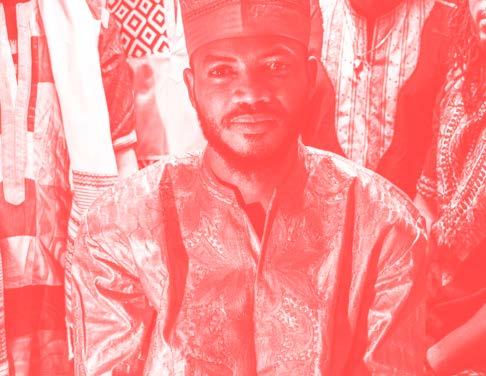
SUNDAY 7 TH OF JUNE HAGAKYRKAN
Playfulness and improvisation are at the center of this meeting of two masters in the field of contemporary Nordic folk music. Parkman and Hirvonen invite us to a space where two voices and two violins create unique melodic and rhythmic textures from the energies emanating from Swedish and Finnish heritage.
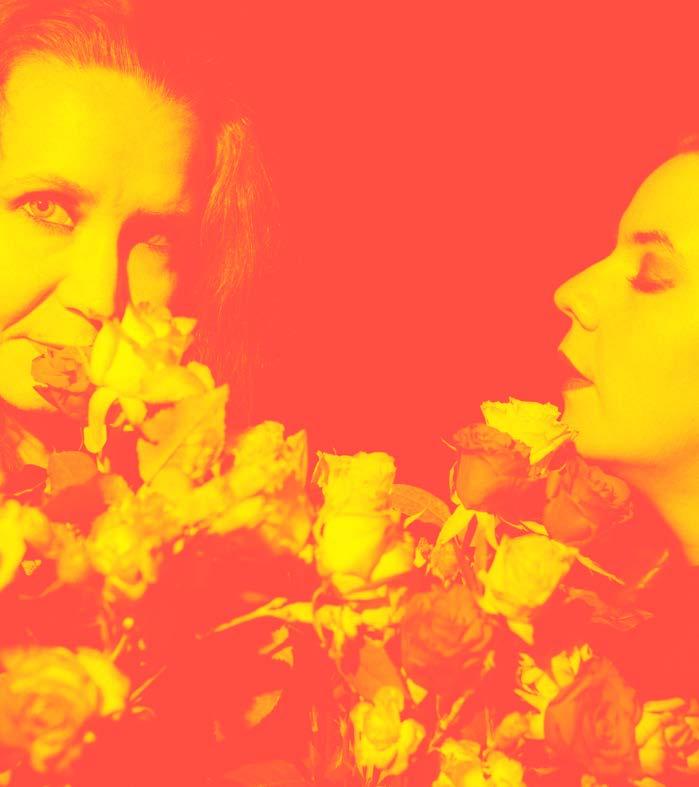
Päivi Hirvonen is a Helsinki based musician and composer. She is firmly rooted in her native music tradition while also creating new forms of
expression, allowing sensitivity and strength to meet in her artistry. She has graduated from Sibelius Academy and is currently a doctoral student researching solo performance and storytelling.
Sara Parkman is a folk musician getting a lot of attention with work that refuses to bow to nationalistic ideas of cultural heritage.
Christianity meets anti-fascism in her music, while tradition and revolution go hand in hand. She has released three albums, all to much critical
acclaim. She is a writer and a founding member of the organization Folkmusiker mot rasism (Folk Musicians Against Racism). In 2016 she toured with Fäboland, a theatrical production based on songs and stories of female cattle farm workers. Parkman has twice been awarded at the Swedish Folk & Världsmusikgalan, and received national newspaper Dagens Nyheter’s Culture Prize in 2020. She is the co- cur ator of Clandestino Festival 2020.
SUNDAY 7 TH OF JUNE HAGAKYRKAN
CLUB
Lula Pena & Lea Bertucci
Alex Zhang Hungtai
Vanligt Folk
Onipa
THURSDAY
OCEANEN
Sahra Halgan
Ultra Satan
Bamba Wassoulou Groove
FOLKTEATERN
FRIDAY
La Bruja De Texcoco
Rob Faka
FYRENS ÖLKAFÉ
Kawabata Makoto
Johannes Anyuru (b. 1979) is a poet, novelist and playwright. He made his debut in 2003 with the critically acclaimed collection of poems Only The Gods Are New

A Storm Blew in From Paradise (2012) was based on his own father’s life and marked an important breakthrough in Anyuru’s authorship. It received rave reviews, reached the #1 spot on the critics’ lists and was awarded and shortlisted for several prestigious literary prizes.
The Rabbit Yard (2017) was a huge success, both critically and commercially, and was awarded the August Prize. Translation rights have been sold to twelve territories and film rights have been acquired by Momento Film.
KG Hammar was archbishop of Uppsala, head of the Church of Sweden, from 1997 to 2006. During his tenure as archbishop he was a highly divisive figure, who gained strong support from some and drew heavy criticism from others, and he oversaw the separation of church and state in Sweden on 1 January 2000. He holds a PhD and is the author of several books on theology.
SATURDAY
FOLKTEATERN
Maarja Nuut
uKanDanZ
Delish da Goddess KOKOKO!
HAGAKYRKAN
Ebo Krdum
Shida Shahabi
ft Linnea Olsson
Maria W Horn
Johannes Anyuru & KG Hammar
Sara Parkman & Päivi Hirvonen
FYRENS ÖLKAFÉ
Kjorstad Brothers
MUSEUM OF WORLD CULTURE
La Bruja De Texcoco
LITTERATURHUSET
Art & Migration:
Elyas Alavi & Kitso Elliot
Roger Robinson
FASCHING
Sara Parkman
FASCHING
KOKOKO!
FASCHING
Sahra Halgan
Mark Ernestus & The Ndagga Rhythm Force
TICKETS
Ticket information can be found online at www.clandestinofestival.org. Age limit of 18+ applies only for venues (Oceanen, Folkteaten and Fyrens Ölkafé) where alc ohol is served. Children are welcome to Hagakyrkan and Museum of World Culture.

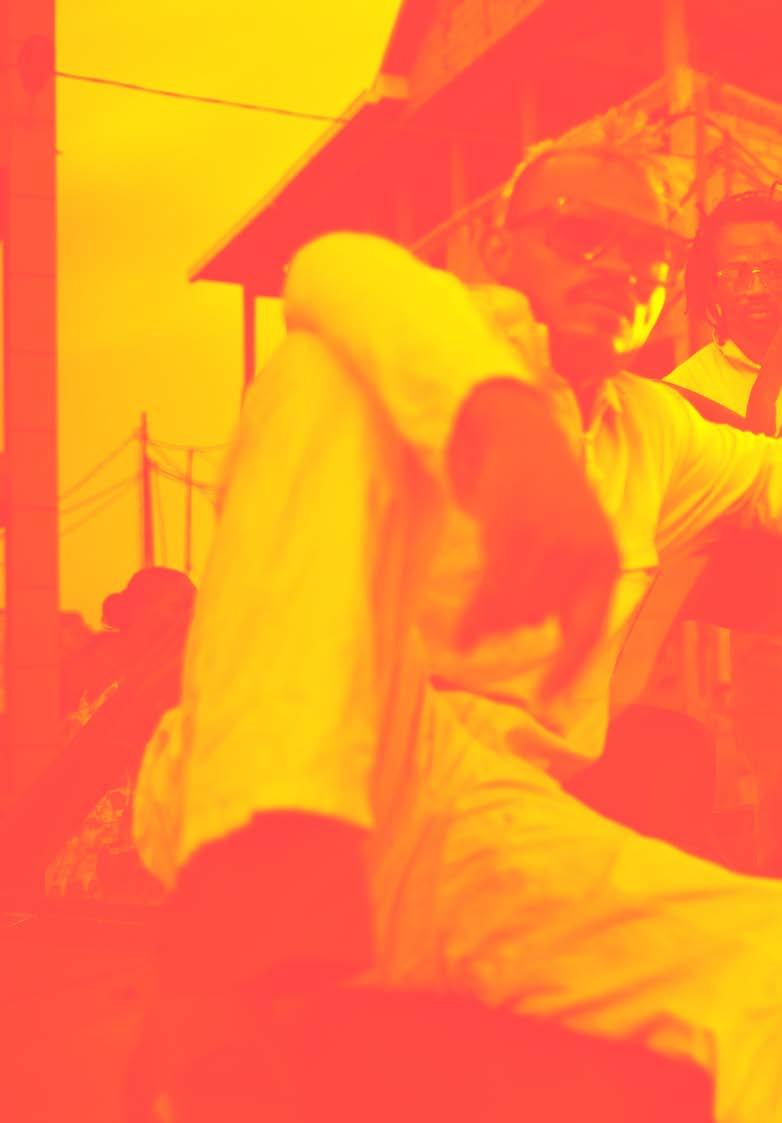
BACKSTAGE
Clandestino Festival has been organized by the non-profit Clandestino Institut since 2003. This event is made possible with support from Västra Götalands regionens Kulturnämnd, Sta tens Kultur råd, Göteborgs Stad Kulturnämnd. Artistic Director: Aleksander Motturi. Co- Curator: Sara Parkman. Graphic Design: Milena Karlsson. Editor: Markus Görsch. Talks Coordinator: Joel Kellgren. Tech Coordinator: Hanna Gödl & Danilo Bogerth. Copy Editing: Barrie Sutcliffe & Erling Björgvinsson. Press: Jennie Hirvasoja, Ebba Lindqvist PR. Financial
Administration: Silva Hildbrand & Anna Hedin, Baker Tilly EMK. Web: Jesper Lind, Nodestar.
VENUES

Folkteatern: Olof Palmes Plats, 413 04 Göteborg. Hagakyrkan: Haga kyrkoplan, 411 23 Göteborg. Oceanen: Stigbergstorget 8, 414 63 Göteborg. Museum of World Culture: Södra Vägen 54, 412 54 Göteborg. Göteborgs Litteraturhus: Heurlins Plats 1, 413 01 Göteborg. Skogen: Masthuggsterrassen 3, 413 18 Göteborg. Fyrens Ölkafé: Stigbergstorget 1, 414 63 Göteborg. Fasching: Kungsgatan 63, 111 22 Stockholm.


PHOTO CREDITS
Sara Parkman: Frida Edlund. Bamba Wassoulou Groove: Olivier Barau. Ultra Satan: Per Nadén. La Bruja De Texcoco: Carlos Huerta, Faka: Isende Lendlela. Elyas Alavi: Grant Hancock. Delish Da Goddess: Rush Jagoe. uKanDanZ: Recyclart. Ebo Krdum: Simon Sahara. Maria W Horn: Aron Mattson. Johannes Anyuru: Khim Efraimsson.